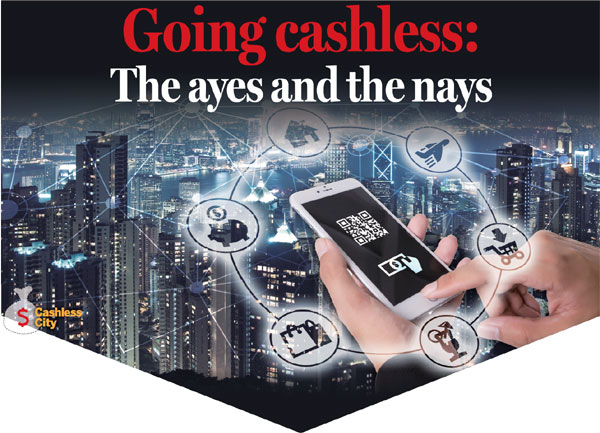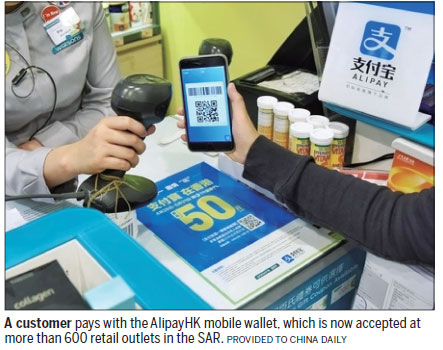Going cashless:The ayes and the nays

HK needs to create a conducive situation for the public to fully embrace mobile payment, reports Oswald Chan.
Hong Kong is often branded a lagger and seen as being far behind other regional economies in efforts to propagate a cashless society despite its sworn resolve to go "smart", and a red-hot tech market that has pushed IPO fundraising by global enterprises in the city to record highs.
Both the Chinese mainland, which has seen an explosion in the use of mobile payment platforms in recent years, and Singapore, which is in the midst of a massive push to go cashless, have plowed much of the heat on Hong Kong to pull its socks up in the race to grab a slice of the lucrative digital payment market.
Industry veterans say while the SAR is keen not to lose out, it desperately needs policy direction, clear regulations, technical standardization and network security in that respect. But, the city is caught in a postulating debate - whether it can give up its long entrenched "cash is king" culture; is able to convince the less tech-savvy population to come on; and willing to subject itself to "Big Brother" acquiescence.
Hugo Mar, who's the program associate of Supercharger Fintech Accelerator, a local incubator of financial technology companies, had sought to depict the scenario Hong Kong is in, forcing himself to do away with cash completely in all financial transactions for one month in May to test the resiliency of the local digital transaction infrastructure.
The result - his experience of forfeiting using cash for that month was "quite painful" in his words - as many small and medium-size stores only recognize cash.
What's even more appalling is what he had seen at Hong Kong Science Park - the very institution the city has put up to breed tomorrow's high-tech enterprises and promote innovation at the local and international levels.
"Many restaurants and food outlets at Hong Kong Science Park only accept cash. I find this totally unacceptable as the technology park is meant to be the bastion of fostering technological innovation," Mar lambasted.
For one month, he had tried almost all the available electronic payment methods in Hong Kong, including the Octopus card, debit card fund transfers, O!ePay, Tap & Go, TNG, PayMe, Alipay and WeChat Pay.
Many large chain stores in Hong Kong, though, were more familiar with electronic payment options, such as the Octopus card, debit cards and credit cards during the experiment, Mar recalled, but small and medium-sized enterprises (SMEs) were still reluctant to embrace digital payment options, including mobile payment.
"SMEs have less incentive to embrace new digital payment technologies because of the costs involved in installing electronic payment machines. The government, if it wants to foster electronic payment, should contemplate offering financial subsidies to SMEs to help them adopt new technologies," Mar told China Daily,
"Another reason is that local consumers are too used to paying with cash or debit and credit cards. They're also worried if mobile payment is safe. Customers should proactively learn these new electronic payment options," he said.
"The beauty of Hong Kong lies in its stringent regulations, but the government should also consider dismantling regulatory obstacles to facilitate mobile payment," he urged. "Most important is that the government should build an ecosystem to attract companies and consumers who're willing to adopt more mobile payment methods."
In Hong Kong, the biggest chunks of the electronic payment market are taken up by the Octopus card issued by MTR Corporation - the city's publicly listed mass transit railway operator - as well as the debit card fund transfer platform operated by EPS Company (Hong Kong) and various credit-card issuers, leaving little room for other digital payment tools to flourish.
Sluggish market growth
Since August last year, 16 stored-value facility (SVF) operators have been licensed by the Hong Kong Monetary Authority (HKMA), but market development has been sluggish. A deep-rooted culture that favors the anonymity of cash payment, an older population reluctant to adopt new technologies, the fear of "Big Brother" snooping on financial transactions, and the numerous available but non-interoperable digital payment platforms are among the barriers that have curbed the market's growth.
The total number of SVF accounts in use stood at nearly 43.5 million in the second quarter of this year - up 3.4 percent from the previous quarter. On a quarterly basis, the total number of SVF transactions was up 0.8 percent to about 1.4 billion, while the total value of SVF transactions rose 6.2 percent to HK$31.8 billion, the HKMA said.
"Despite Hong Kong's mature electronic payment ecology, some people are still wary of the development of mobile payment. To further promote mobile payment, establishing a neutral platform, optimizing the existing electronic payment platforms and extending the application scenarios are some means that are worth discussing," local think-tank Bauhinia Foundation Research Centre said in a research report.
According to data portal Statista, mobile and electronic payment transactions in Hong Kong would hit $529 million this year.
The HKMA plans to launch a "Faster Payment System" in September next year - a platform that can connect different SVF tools and support interbank fund transfer services. The de facto central bank hopes the platform can support the use of mobile phone numbers or email addresses for payments in Hong Kong dollars and yuan anytime and anywhere.
In addition, an industry working group has been established to facilitate a common QR code standard that could promote the wider user of mobile retail payments and offer greater convenience to customers and merchants.
Hong Kong's taxi industry has stood out as a perfect model, epitomizing how "sluggish" our society has been in embracing digital payment.
Taxi commuters can now pay their fares in a cashless way when riding in a taxi fitted with the electronic payment tool. The move has been described as revolutionary as taxi drivers have been stubbornly reluctant to accept any mobile payment method apart from cash.
CamClaim Ltd - a Hong Kong Science and Technology Parks Corporation incubatee, along with UnionPay International, China Mobile, and two taxi car dealers K&R International and Excelente Service Co - launched a three-month pilot digital payment scheme for the taxi industry this month.
The pilot scheme involves 15 taxis installed with smart point of sales (POS) terminals developed by CamClaim's subsidiary payment platform - One2Paid.
The platform accepts Apple Pay linked with customers' debit and credit cards with the UnionPay logo, or customers can tap their UnionPay debit cards or swipe their UnionPay credit cards to process electronic payment of taxi fares. It also allows customers to tip drivers if they wish. UnionPay International currently issues 63 billion debit and credit cards globally.
The 35 taxi drivers joining the scheme will be given UnionPay International's prepaid cards to log in and log out the payment gateway to authenticate their identities. UnionPay International will reimburse their incomes within one business day.
These two attributes help to resolve the drivers' two biggest worries and bolster their confidence in CamClaim's smart POS terminals.
If the new service is well received by the market, CamClaim may extend it to as many as 200 taxis. The startup is also liaising with other taxi car dealers in Hong Kong to ensure that new taxis are fitted with CamClaim's smart POS terminals.
"Taxi drivers are willing to accept digital payment options if the problems of online security and demand for fast income reimbursement can be resolved," said Anthea Ip, chief executive officer of Excelente Service Co. "Digital payment options also spare taxi drivers the trouble of having to give change when customers pay with large-denominated notes."
Taxis to accept WeChat Pay HK
Tencent Holdings' WeChat Pay is also making inroads in the Hong Kong market, as more than 1,000 taxis are expected to accept WeChat Pay HK as a payment option by the end of this year, according to WeChat Pay HK. The company also plans to expand its payment services at the city's newspaper stands, restaurants, supermarkets, chain stores and retail stores.
Valoot Technologies, a local fintech startup, launched its mobile payment platform Valoot Pay last month, enabling several thousand more local taxis to accept AlipayHK and WeChat Pay HK by the end of November.
Besides the taxi sector, wet markets and local eatery shops will be the next battlegrounds.
Three restaurants have already adopted CamClaim's smart POS platform that integrates monetary transactions, business order-taking and business monitoring in one go. The eateries can take food orders through the app platform developed by CamClaim. After delivering the food, restaurant staff can take along the smart POS machine to collect the bills without having to use cash.
CamClaim intends to introduce more than 50,000 POS terminals for various industries over the next three years. By the end of 2019, the startup will deploy cross-boundary mobile payment services.
"We see huge potential in the online-to-offline payment market as there are now very few service providers addressing the business needs of this market segment," CamClaim Founder and Chief Executive Officer Joey Lam told China Daily. "This is because although more people are making online purchases, most of them are still required to pay offline for various reasons and our payment solutions can fill the market vacuum."
Lam and two other company founders had invested HK$3 million to set up CamClaim with the vision to foster digital payment in Hong Kong. The company is talking to angel investors to seek a further $5 million to support their ambitious overseas expansion plans in Japan, Indonesia, Malaysia, Singapore and South Korea.
Ant Financial Services Group - an affiliate company of the Alibaba Group controlled by technology billionaire Jack Ma - has teamed up with Uni-China (Market) Management so that its payment platform AlipayHK can be accessible to 43 hawker vendors at MC Box Po Tat Market in Kwun Tong by the end of this year.
Ant Financial Services Group also cooperates with tycoon Li Ka-shing's CK Hutchison Holdings so that AlipayHK can now access CK Hutchison's 600 retail outlets.
Anthony Chiu, owner of several fair-trade product retail outlets selling, among other things, snacks and skin-care products in the city, begged to differ. Besides cash payment, the outlets now accept Octopus cards and will install credit-card terminals to accept credit-card payment in the near future.
"Our customers tell us that the Octopus card and various credit cards are sufficient for cashless transactions. They do not prefer other mobile payment options like Alipay or WeChat Pay because they are normally linked to banking accounts," Chiu told China Daily.
He said lower transaction costs for SMEs is crucial in encouraging small vendors to accept more electronic payment options.
Octopus Card Ltd currently levies a 1.3-percent commission charge on each transaction conducted at Chiu's stores, whereas credit-card issuers collect a 2-percent service charge per transaction. In addition, Chiu's stores' total monthly transactions have to reach a certain threshold for monthly service charges to be waived.
"We accept payments with Octopus and credit cards because the business volumes justify it. For Alipay or WeChat Pay, we don't think it can cover the costs as customers, generally, are reluctant to accept these two mobile payment options for the time being," Chiu said.
Cross-boundary services

Digital payment is just the first step. Market players are also mulling the launch of electronic cross-boundary remittance services.
TNG FinTech Group, the parent company of TNG (Asia) which is one of the SVF licensees in the city, announced in September that its e-wallet services will cover global money transfers from Hong Kong and 12 Asian countries to the United Kingdom. It also plans to invest $20 million to launch a local e-wallet in the UK.
Tencent Holdings also works with local fintech startup EMQ to provide a new remittance function on its WeChat social platform, allowing 170,000 Filipino domestic helpers in Hong Kong to remit money back to their homeland.
"Digital payment operators should focus on a slew of cross-boundary banking services rather than just payment services because Hong Kong is such a small market," reckoned Terence Chong Tai-leung, an economics professor at the Chinese University of Hong Kong.
He believes the government should promote digital payment services initially and then scale up the market by extending it to a slew of digital banking services.
"Maybe, only two to three SVF licensees can survive amid fierce market competition. The government should consider allowing them to start remittance, deposit, lending and investment services to enrich electronic banking services types," Chong told China Daily.
In Lam's view, the government's vague policy on financial technology, the lack of regulatory clarity and banks' lukewarm stance on digital payment technology outweigh technology development as the major hurdles to the market's growth.
"The government should have a role in promoting the market, but it has not played its part. It takes time for the government to formulate clear policies to foster the digital payment market as it involves inter-departmental coordination," she said.
Contact the writer at oswald@chinaailyhk.com
















